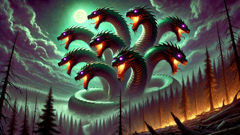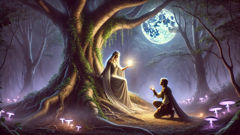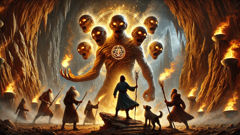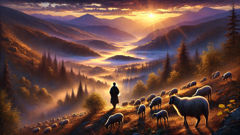Introduction
In the wild heart of Bulgaria, where the Balkan Mountains rise like ancient stone giants and mist curls above emerald valleys, legends have always wandered as freely as the mountain goats. Among these stories, none has kindled more awe and fear than the myth of the Zmey—a creature of shadow and flame, scaled like the serpents of the underworld, crowned with many ferocious heads, and wielding power to bend storms and terrorize entire villages. Generations have whispered of the Zmey's lair, hidden deep within a cavern shrouded by twisted pines and impenetrable fog. Children learned early to avoid certain paths at dusk, lest the wind carried a sulfurous breath or the earth trembled beneath unseen wings. Yet it’s not only fear that the myth carries; woven through the tapestry of dread is a golden thread of courage. For every tale of devastation there is also the story of an unlikely hero—one who rises from the humble soil of daily life, armed not with swords forged by kings, but with the strength of heart, wit, and a spirit that refuses to bow. This is the story of Boyan, a shepherd whose life was shaped by the green slopes and restless streams of his mountain village. It’s a story that speaks not only to Bulgarians but to anyone who’s ever faced a darkness that seemed insurmountable. Through Boyan’s journey, the myth of the Zmey becomes more than a fireside warning; it becomes a celebration of hope, resilience, and the enduring connection between people and the land they cherish. Set in a time when magic was as real as the turning of the seasons, this legend captures the pulse of a place and a people determined to stand together, even when the night grew darkest and the dragon’s roar echoed across the peaks.
The Shadow of the Zmey
Long ago, in the secluded hamlet of Golyamo Selo, life moved with the seasons. Spring brought wildflowers that spilled down the slopes in a riot of color, and autumn painted the forests with gold. But every villager remembered that the beauty of the land came at a price. They spoke in hushed tones of the Zmey, whose wrath could turn green fields to ash overnight. The old ones recalled years when thunder rolled unnaturally, cattle vanished, and smoke rose from the far cliffs—the sure sign the Zmey was near. No one alive had seen it clearly, but everyone agreed on its shape: a serpent as long as the river Iskar, covered in emerald and bronze scales that shimmered like burning coals, and crowned with seven heads, each with eyes that glowed like lanterns in the dark.

Boyan was seventeen the summer the Zmey returned. His father had died years before, lost in a sudden landslide after a storm no one could explain. Now, Boyan tended his sheep alone, his days filled with the patient rhythms of mountain life: coaxing lambs from brambles, mending fences, and playing his wooden flute as dusk crept through the trees. He was strong but gentle, known for his kindness to both animals and people. Yet there was a restlessness in him—a sense that something beyond his simple life waited in the shadows.
That summer, storms battered the mountains for days. Lightning split ancient oaks, hail ruined the wheat, and the streams swelled until bridges threatened to give way. After each storm, a new terror arrived: livestock disappeared, orchards were scorched, and sometimes, children saw strange shapes gliding through the clouds at night. The elders gathered in the stone church, clutching icons and muttering prayers, but their eyes betrayed a deeper fear. It was Stoyan, the oldest shepherd, who spoke what no one else dared: “The Zmey has awoken. The mountains are angry.”
Panic spread. Families spoke of leaving, but where could they go? The land was their life. When a sheep was found burned and twisted at the edge of Boyan’s flock, he felt the dread settle in his bones. He remembered his father’s stories—how a true Zmey could bring madness, how it could not be killed by iron alone, and how its presence warped the very air. Still, Boyan refused to flee. He cared for his sheep, comforted frightened neighbors, and kept watch for signs in the sky.
One moonless night, Boyan woke to the cries of his dog, Perun. Through the window, he saw an unholy glow pulsing from the ridge above the village. He hurried outside, gripping his staff, Perun at his side. As he reached the ridge, a gust of wind nearly knocked him down. The trees twisted, their leaves hissing as if in pain. Then he saw it: a colossal shape, coiled around a blasted pine, scales flickering between green and copper in the unnatural light. Seven heads rose above the canopy, smoke curling from their nostrils. One head turned toward him, and Boyan’s heart nearly stopped as a voice echoed—not from any mouth, but inside his mind.
“Why do you watch, little shepherd? Do you seek to feed me?”
Boyan stood his ground. His hands shook, but his voice was steady. “Leave us. The people have done nothing to you.”
The heads laughed, a sound like thunder in the gorges. “Your courage is sweet. I will taste it soon.”
With a rush of wings, the Zmey vanished into the clouds, leaving a trail of burning leaves. Boyan stumbled home, changed forever. He knew now what he faced—not a beast, but an ancient force, clever and cruel. The fate of Golyamo Selo was entwined with his own.
From that night forward, Boyan watched the skies. By day, he listened for omens: a sudden silence among birds, a chill that stole across the meadows. By night, he heard whispers in the wind. Yet he did not surrender to despair. Instead, he began searching for answers—visiting elders, learning old prayers and charms, and seeking tales of how Zmeys had been defeated in ages past. Legends spoke of heroes who used cunning as much as strength, and who found allies in unexpected places: wise women, wandering monks, even the spirits of the mountains themselves.
The village, seeing his resolve, gathered behind him. Old Stoyan gave him a charm carved from rowan wood. Baba Nevena, the herbalist, gave him a pouch of herbs said to repel evil. And Perun, his loyal dog, never left his side. Boyan’s courage became a lantern in the dark—a promise that Golyamo Selo would not go quietly into ruin.
The Gathering of Courage and Magic
As days passed, the Zmey’s attacks grew bolder. Smoke rose from outlying farms. Chickens and goats vanished. Sometimes, villagers heard laughter on the wind—a mocking echo that chilled them to the core. Still, Boyan refused to leave or let fear win. He spent his days learning all he could from the village’s oldest stories, hoping to find a weapon against their ancient foe.

One dusk, while searching for a lost lamb near an old oak, Boyan stumbled upon an ancient shrine half-hidden by brambles. It was little more than a stone slab covered in moss, but carved on its surface were runes older than the village itself. Boyan knelt and touched the stone. Instantly, he felt warmth travel up his arm, and in his mind he heard a woman’s voice—a whisper like wind in the grass. “Do not fight the Zmey with anger alone. Seek wisdom in the forest’s heart.”
Troubled but resolute, Boyan visited Baba Nevena. The herbalist listened closely to his tale and nodded. “That is the voice of Mara, the forest’s guardian spirit. She helps those who show respect for the land.” Baba Nevena brewed him a potion from wild thyme and mountain honey. “Drink this before you face the Zmey. And remember: cleverness is as mighty as strength.”
In the days that followed, Boyan gathered allies. Children watched for signs of smoke and flame. Women prepared herbs and prayers. Old Stoyan taught Boyan to carve symbols of protection into his staff. The blacksmith reforged a broken ploughshare into a blade with patterns of starlight etched along its edge. At night, Boyan walked alone into the woods, seeking the heart of the forest. Perun always followed, his nose to the ground.
One night, guided by the full moon, Boyan reached a grove so ancient that even the wind seemed to whisper secrets. There, beneath a mighty beech tree, he found Mara herself. She appeared as a woman clothed in leaves and moonbeams, her eyes deep as mountain pools. “You are brave,” she said. “But courage alone will not defeat the Zmey. You must understand its pain.”
She led him to a spring hidden beneath a tangle of roots. “Drink,” she instructed. As the water touched his lips, Boyan saw visions—flashes of ancient wars, burning forests, villagers once cruel to dragons and spirits alike. He understood then: the Zmey’s rage was born of old wounds, fanned by centuries of fear and violence.
Mara gave Boyan a silver talisman. “This is the Tear of the Mountain. It will shield your heart from the Zmey’s poison, but only if you show mercy when victory is near.”
Boyan returned at dawn, changed. He spoke to the village elders and shared what he’d learned. Some were skeptical, but most saw new hope in his eyes. Together, they made plans—not just to survive, but to break the Zmey’s cycle of hatred once and for all.
The village prepared for a final confrontation. Boyan slept little, sharpening his blade and learning new prayers. Yet he carried no hate in his heart—only a fierce determination to protect his people and bring peace to both land and beast. On the eve of battle, Mara’s voice came to him once more: “Remember—true strength lies in understanding.”
As dawn crept over the mountains, Boyan gathered his friends, his dog Perun at his side, and set out for the Zmey’s lair. Above them, the clouds swirled like a warning. But in their hearts burned a courage that no dragon could ever steal.
The Lair of the Zmey
The final march toward the dragon’s lair began at first light. Boyan led a small band: old Stoyan with his rowan-wood charm, Baba Nevena clutching her herbs, three young shepherds, and Perun bounding ahead. Each step up the stony path was heavy with both dread and hope. The air grew colder; fog clung to their feet. They passed old shrines and toppled menhirs, places where ancient rituals had once kept harmony between humans and spirits.

As they neared the mountain’s highest hollow, signs of the Zmey’s presence multiplied: scorched earth where nothing grew, bones scattered like white runes across blackened grass, and claw marks gouged deep into stone. Even birds dared not sing here.
At last they reached the cave—its mouth yawning wide as a wound, exhaling sulfur and darkness. The villagers huddled together as Boyan stepped forward. He felt Mara’s talisman warm against his skin. Whispering prayers under his breath, he led them inside.
The tunnel was vast and echoing. Shadows writhed along the walls; here and there, old paintings showed men and beasts locked in endless battle. Deeper still, they found evidence of recent devastation: charred bones of sheep and oxen, shattered tools, even bits of woven cloth from those who’d vanished. The weight of sorrow pressed down.
Then, from the depths came a rumble like thunder. The Zmey appeared in its full horror—seven heads weaving in unison, each exhaling smoke or flame. Its eyes fixed on Boyan.
“So you’ve come,” hissed one head.
“To plead for your pitiful lives?” sneered another.
Boyan gripped his staff and blade. “We’ve come to make peace,” he called out. His voice echoed down the stone corridors.
The Zmey’s laughter shook dust from the ceiling. “Peace? You are brave—or foolish.”
But Boyan stood firm. “We know your pain. The wounds of old have never healed. But more hatred will only bring more suffering—to us all.”
A moment passed—then all seven heads lunged at once. Fire roared; venom hissed through the air. Boyan raised his shield and deflected the onslaught. Stoyan called out prayers; Baba Nevena threw herbs into the fire, releasing clouds of sweet smoke that confused the monster.
For what seemed hours, battle raged: Perun darted in and out, distracting one head while Boyan faced another. His friends protected him from behind with chants and courage. At last, when Boyan saw exhaustion in the Zmey’s movements and sorrow in its many eyes, he stepped forward and laid down his weapons.
“Enough,” he said gently.
The cave fell silent but for their breathing.
He reached for Mara’s talisman and held it high. “Let this be an end to hatred.”
The dragon hesitated—then began to shrink, its scales fading to mist, its rage melting into tears. With a shudder that shook stone and sky, it vanished, leaving behind only a single glowing emerald scale.
The storm above lifted; sunlight poured into the cave. Boyan picked up the scale and placed it in a shrine at the cave’s mouth—a sign for future generations that courage and compassion could break even the oldest curses.
The villagers returned home in triumph. Fields flourished; laughter returned; children played in the meadows without fear. And Boyan—the shepherd who faced a dragon—became a legend not just for his bravery but for his mercy.
Conclusion
The sun rose slowly over Golyamo Selo as Boyan and his companions reached the mouth of the Zmey’s lair—a vast cavern cut into the living rock. Wind howled from its depths, and the stench of sulfur hung heavy in the air. As they entered, Boyan felt Mara’s talisman pulsing against his chest, filling him with calm. Inside, shadows writhed and fire flickered along the walls. The Zmey uncoiled with terrifying grace, seven heads swaying as it regarded the intruders. Boyan stepped forward, staff in one hand and the silver blade in the other. Around him, his friends chanted protective prayers, and Perun barked bravely. When the Zmey’s voices rose in a chorus of threats, Boyan stood firm and spoke—not with anger, but with understanding. He acknowledged the pain and fear that haunted both dragon and people. For a heartbeat, silence reigned. Then the Zmey lunged, fire and venom spewing from its mouths. Boyan’s shield flashed with mountain light. With courage, wit, and the gifts of his village and Mara, he battled fiercely, dodging flames and answering each attack with resolve. At last, when the Zmey faltered—its rage spent and heads bowed—Boyan offered mercy instead of vengeance. He laid down his blade and spoke words of peace. The Zmey’s eyes dimmed, and with a shudder that shook the cave to its roots, it vanished into mist, leaving behind only a single emerald scale. The storm clouds lifted from Golyamo Selo. The land healed; fields grew green and birds returned to sing. Boyan was hailed as a hero, but he never claimed the glory for himself. Instead, he thanked his friends, his dog, and the spirits of the forest. The legend of the Zmey was forever changed—from a tale of terror to one of hope, wisdom, and the enduring power of courage.













